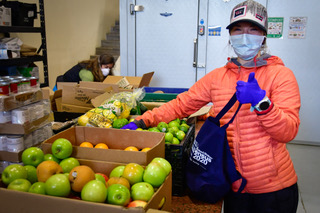With COVID-19 mounting, a food program buys, bargains, and packs anew
When COVID-19 closed down ski operations and restaurants in Vail, Colorado, recently, truckloads of food that were headed for upscale restaurants suddenly had nowhere to go. Eagle Valley’s The Community Market, a small local food bank, seized the day—and the trucks. “We purchased the food,” reports Susie Davis, director of community impact at the umbrella Eagle Valley Community Foundation. The deal was unprecedented: 20 cents on the dollar.
Purchasing orphaned restaurant food was just one of many pivots The Community Market made in the early weeks of the COVID-19 response, well before the statewide shelter-in-place order was established in late March. With a 2017 assessment in hand, Market staff readied for a spike in demand. In February, they were feeding 1,050 people. By April, they were feeding 3,160. But they were ready to meet the need, and they’re still innovating.
How do they do it without putting customers and staff in jeopardy? The Market allows just one shopper at a time to “choice shop.” Meanwhile, boxes of groceries are prepacked; packers add items, such as dairy foods, based on a form that customers who’ve decided against choice shopping complete in their cars. “Choice shopping is a dignity issue,” notes Davis, “but we had to modify it.” To reduce the chances of spreading COVID, the market also reduced its daily volunteer staff from 12 to two, and then added an evening shift of paid staffers to pack the grocery boxes.
On the supply side—with the restaurant windfall completed—the Market continues to take in surplus from grocery stores and seconds from Western Slope farms. And, recently, the Market negotiated a new deal—an arrangement that will ensure that farmers, who are struggling with lower demand, will plant new crops this year. “We’ve prepaid,” Davis explains. “It’s similar to community-supported agriculture.”
Enabling the Market to pivot this way is an unusual financial structure that involves 40 founding families, plus a range of grants, including $150,000 in emergency funds from the William G. McGowan Charitable Fund. Davis also cites community partners: Some 70 small businesses are providing assistance; Food Bank of the Rockies is a partner; and even a farming implement store has contributed by donating masks. Finally, she cites the community itself: 50 percent of volunteers are customers, and the staffers are bilingual, dedicated, and flexible. “We huddle every morning—it’s a distant huddle now,” says Davis. In the midst of rolling shutdowns and pandemic, staff are seemingly undaunted. “I can’t tell you how amazing this team is.”

